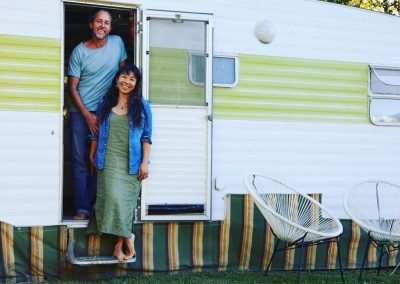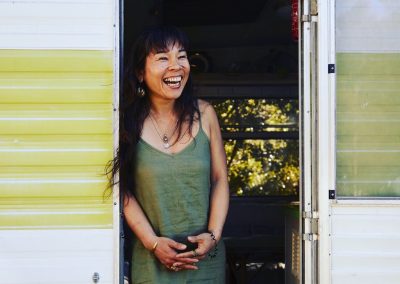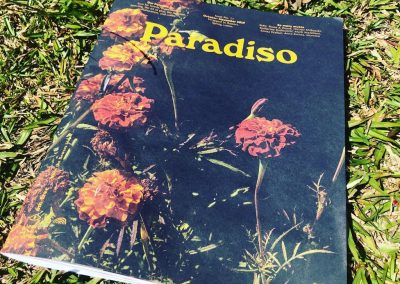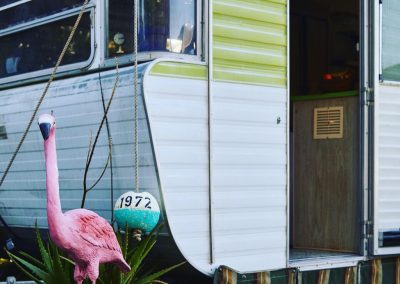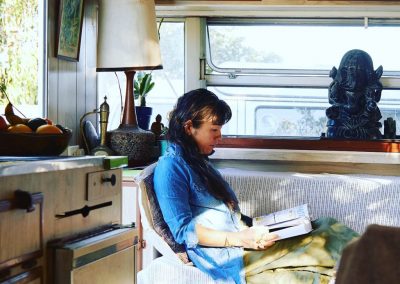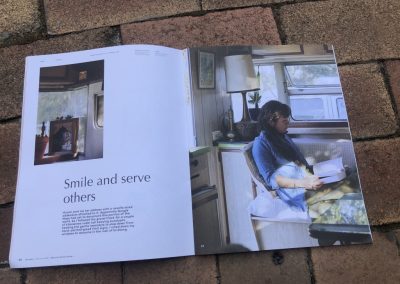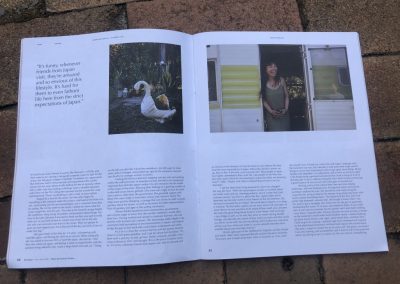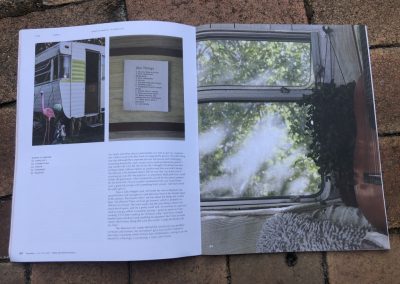Paradiso – Magazine Interview of Hiromi
Photography & Text – Anna Hutchcroft
Full Length Interview
Hiromi’s sent me her address with a novella sized addendum attached to it. Apparently Google Maps had yet to document this portion of the world. As I followed the gravel track for a couple of kilometres under tall swaying eucalypts, heeding the gentle reminders to slow down from hand painted speed limit signs, I rolled down my windows to welcome in the rush of birdsong.
It’s hard to pin down Hiromi in words. She lives such a full life, and she’s come so far. Leaving a fast-paced corporate career to fight for the ocean, she led Japan’s chapter of Surfrider Foundation (an organization that dedicates itself to the protection and enjoyment of the world’s oceans) for five years before finally finding her feet in Australia where she’s a chef, runs miso making workshops, hosts a monthly Japanese radio show on Bay FM, and guides Japanese tourists around the coast and hinterland. There’s no doubting it: she’s a lady of many talents.
Shaped by a love for the ocean, her love affair began by marvelling at the creatures under the surface, continued at the helm of a sail, wind surfing into the sea around Japan, and is sustained these days by surfing. She cut her teeth on the ocean. I asked her about what the ocean taught her, and she said, “You have to be mentally strong despite the conditions. Keep trying, be patient, and persistent about things. You have to be calm, because if you start to freak out then you really start to really freak so you kind of have to control your mind. You’re the only one who can overcome your fears in the ocean. There are people to push you and support you but at the end of the day you kind of have to make that step.”
She gave freely of her time for 3-4 years, volunteering with Surfrider Japan, and honing her skills as an activist. When eventually she was asked to become CEO of Surfrder Japan , she said no. “And then they asked me again, and feeling a sense of responsibility with the position being offered to me, I took a deep breath and said yes. .” Taking on the job just after the Fukushima meltdown, she felt eager to make some radical changes, and pushed up against the resistance reserved specifically for younger women in power.
Finding the balance between stepping into her role and working within the cultural norms of Japanese society, she felt immensely important that Surfrider Japan conduct its own research into the health of the ocean at that time. Relaying their findings to a growing number of surfers and ocean lovers globally who were very eager to hear the truth from a source other than the government. She garnered support with those who were ready to have their voices and concerns heard. The times were quickly changing, a change that was driven by both curiosity and fear about the ocean as well as necessity for better representation from all genders and ages in the surfing community.
Hiromi fielded questions from communities, governments, and citizens eager to know how the nuclear meltdown would affect their lives. Having worked and owned a corporate business, she was familiar with bureaucratic systems. This knowledge added depth to the commonly held perception of environmentalists in Japan, and helped bridge the gap so that each side could better understand each other.
It’s a far cry from the caravan that her and her partner Damien share in a lush green paradise, and I ask her about her transition. “It’s been such a journey, to end up here. Quite a miracle, actually. I first came to Byron in 2011 and thought ‘this is the place I want to move to.’ It’s funny, whenever friends from Japan visit, they’re amazed and so envious of this lifestyle. It’s hard for them to even fathom life here from the strict expectations of Japan. When they see the caravan set up, they’re like ‘Is this real, your everyday life? Most people in Japan live highly committed to their work life. Like people in the West too, they have such a thirst for reconnecting to nature but often not knowing how?” I offer. “Totally. And I feel so blessed that we have it on our doorstep.”
I ask her about how being exposed to nature has changed the way she lives. “Well, the tap just goes outside so we think about our waste water and our cleaning products, and of course that’s just common sense if you live in a place like this. I guess when you’re detached you become numb to your impact on the environment. But obviously everyone has an impact. The small space requires us to keep it minimal. The hot water systems run on solar, and it’s all rainwater, so when there’s no rain you have to be aware of how much you consume. But that’s the great thing about living in a tiny house. And we’ve got a tiny fridge as well, so we only buy what we need. Having limited storage, you become very aware of how much you have and how much you throw out as well. You see everything, and it makes you conscious of how you live, what your waste is, so you naturally become more sensible about your everyday choices.”
Hiromi spent part of her childhood in England, and her friends and family didn’t seem surprised that she would relocate to Australia. “Everyone said it made sense that you move to Australia so you can come into yourself more. Friends say I seem free and happy. Language wise, the transition was easy, but culturally it took some time to get used to things or not to have expectations and not get upset about things. Being flexible and adaptable is an adjustment, and to learn to not be so rigid. I like things being organised and planned but I had to let go of a lot of that because it’s just a different mentality. But I think it’s just maintaining a good balance of who you are and what goes on around you.”
Sharing a slice of her culture here, she runs miso making workshops, and runs boutique tours for Japanese surfers and tourists wanting to explore the area. She learned to cook whilst living the corporate life, trying to balance the stresses of grueling long hours with home-cooked nourishing meals. “My husband at the time and I had pretty high powered corporate jobs. We bought a house when I was 24, and we got a mortgage. Our future was set. We got an apartment overlooking the ocean, in Urayasu, just outside of Tokyo. It was really nice. It was easy to commute, but my partner and I were both working crazy hours, corporate jobs. Anyway, because we were so busy, at home on the weekend I would make some healthier meals. I started studying up about macro-biotics, and vegan, plant-based diets, and that’s how I kind of got into cooking. I started to get more interested and inspired by the plant based movement and how food impacts on the environment. I became a vegan for maybe five or six years and I felt good, you know? I was into farming, and sustainability, and it kind of led to the point that what I was doing to earn or sustain my life was kind of contradicting my values and ethos about sustainability so I had to quit my corporate job. I didn’t want to be that kind of irresponsible person. The other thing was that although the corporate job was fast-paced and challenging, rewarding financially, and a source of so much professional growth, I just couldn’t do it for the rest of my life. I thought I’d just become one of those robots without interest or passion and that was really boring. My dad was a bit shocked when I left, he was like ‘you know you’re screwing up your life’ because he’s a committed, dedicated man. A part of that old generation, who’s worked his ass off for the same company for his entire life. He just couldn’t understand why you would leave such a good job and go with something that’s unsure. I still don’t think he really gets it.”
Now a fully fledged cook, she holds her own in Bayleaf’s fast-paced kitchen and manages to cook delicious food in the limited space of the caravan. She beams when I ask her about the things she creates here. “It’s efficient! There are four gas burners, which is probably no different to a house. The oven works, but the only thing is there’s not much bench space, and it’s a pretty small sink, so you have to cook and wash as you go, which is essential anyways. I guess as much as I love cooking, if I’ve been cooking for 10 hours a day, I just have a simple healthymeal and don’t cook anything too gourmet.. But I love to make ramen. We’ve been doing that a lot this winter. I make the broth with my miso.”
The afternoon sun creeps behind the caravan as I say goodbye to Hiromi and Damien, but not before I get a tour of all of Damien’s retro lawn ornaments which Hiromi eyes off dubiously. Joining in on the farewell is a flamingo, a currawong, a swan, and a koala.

